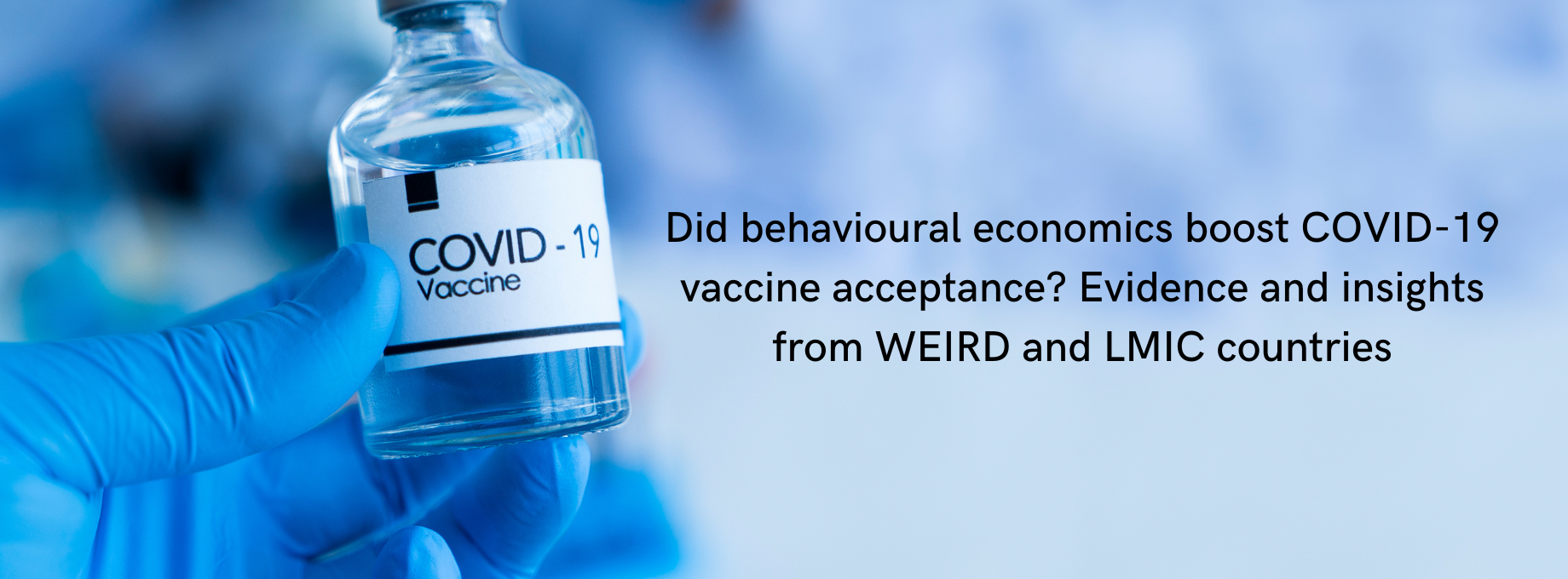We are looking forward to Alison Buttenheim’s visit to the Leverhulme Centre for Demographic Science at the end of this month. During her visit, Alison will give a talk on whether behavioural economics boosted COVID-19 vaccine acceptance, using evidence and insights from WEIRD (Western, Educated, Industrial, Rich, and Democratic) and LMIC countries.
The talk will take place at Nuffield College on Tuesday 30 May, 14:15-15:30 BST. Please email LCDS.Office@demography.ox.ac.uk by Friday 26 May if you would like to join in person or online. More information can be found here.
You can also join Jonas Schöley from the Max Planck Institute for Demographic Research (MPIDR) on Monday 15 May for an LCDS Seminar on the phenomenon of "birth hump", the excess risk of death associated with the transition of birth. Find out more here.
Talk title: Did behavioural economics boost COVID-19 vaccine acceptance? Evidence and insights from WEIRD and LMIC countries
As countries around the world rolled out the COVID-19 vaccines to the public in 2021, many countries faced more vaccine hesitancy and weaker demand for the vaccine than anticipated. In response, governments, public health agencies, and health behaviour researchers scrambled to design and implement programmes and strategies to bolster demand. Financial incentives and other behaviourally-informed strategies like exclusivity prompts and social proof messaging were promising approaches, based on prior evidence from other health behaviours and vaccination campaigns.
In this talk, Alison Buttenheim will review the theory motivating the scramble for behavioural solutions to COVID-19 vaccine demand, discuss several different intervention designs that were tested (e.g., regret lotteries, “reserved for you” messages), and summarise the results from multiple studies in diverse settings, including several that she helped to design and implement. While there are examples of positive effects in some studies, the preponderance of the evidence suggests that the potential for behavioural insights to boost the COVID-19 vaccine roll-out was not fully realised. The talk will conclude with both research and practice implications for COVID-19 and other vaccination programmes going forward.
Bio: Dr Alison Buttenheim
 Alison Buttenheim is the Silverstein Chair in Global Women’s Health and Scientific Director of the Center for Health Incentives and Behavioral Economics at the University of Pennsylvania.
Alison Buttenheim is the Silverstein Chair in Global Women’s Health and Scientific Director of the Center for Health Incentives and Behavioral Economics at the University of Pennsylvania.
Her research addresses persistent behaviour change challenges in public and global health. Using the techniques and frameworks of behavioural economics, Dr. Buttenheim designs, tests, and scales innovative interventions to prevent and mitigate infectious diseases.
She is a recognised global expert in the area of vaccine acceptance, with a particular focus on COVID-19 vaccines. Dr. Buttenheim also helped launch and serves as the Behavioural Design Lead for Indlela, a first-of-its kind nudge unit supporting innovations in HIV service delivery in South Africa. She co-chaired the US National Academies of Sciences, Engineering and Medicine’s Consensus Committee on Behavioral Economics: Policy Impact and Future Directions, which recently released its consensus report.



